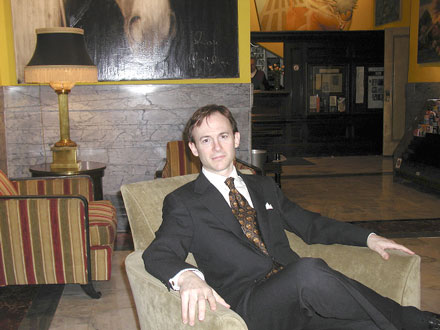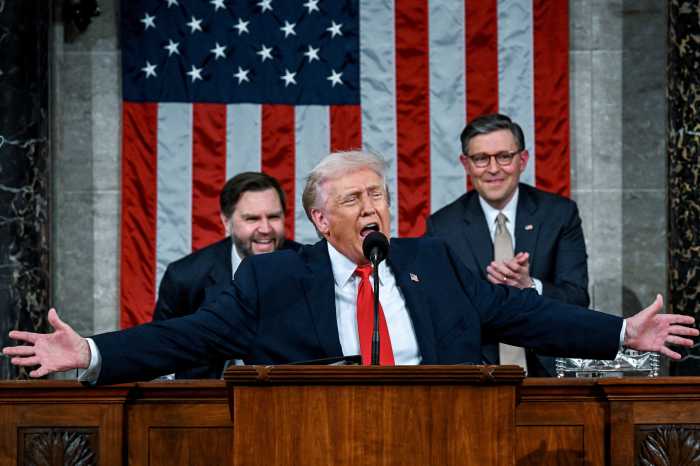Bruce Levingston returns to Alice Tully Hall, to commune with masters and muses
In October 1905, a soldier of the Austrian-Hungarian Empire bayoneted 20-year-old Franti&Mac249;sek Pavlík, a Czech worker, as the young patriot demonstrated in Brno on behalf of opening a national university. Like other nationalist martyrs, Pavlík’s death inspired widespread sentiment. So moved, Leo Eugen Janácek wrote the piano sonata “From the Street” in which the famous Czech composer engraved his solidarity with fellow nationalists.
Brno lies far from Greenville, Mississippi, the birthplace of Bruce Levingston, a gay New Yorker and classical pianist, who will perform that stirring sonata, along with other classical compositions, at a solo recital at Alice Tully Hall on April 27.
The Mississippi native, born in 1961, recently spoke about growing up in a family that respected musical talent and civil rights.
“I know that my parents cared deeply about civil rights and in their quiet way, tried to make a difference in people’s lives,” said Levingston, who acknowledged that his family’s sensitivity to the struggles of African Americans for equality was informed by the Levingstons’ European Jewish ancestry whose forebears settled in the deep South as long ago as 1820.
As well as a civically minded upbringing, Levingston and his brother were also imbued with an appreciation for the arts, particularly music, but unavoidably literature, the residents around Greenville cognizant of their region as settings in the writings of Eudora Welty and William Faulkner.
At the age of six, rather than a paintbrush or for that matter, a typewriter, Levingston was tickling the ivories on a family piano. Levingston’s father, a successful businessman, owned an extensive collection of classical music and his paternal devotion included gathering the family around that piano, which, some thirty-five years later, lends credence to the quaint aphorism as to how one gets to Carnegie Hall, or in this case Lincoln Center.
“My parents recognized I had talent and I took piano lessons from my mother and at Delta State University,” said Levingston. By the age of 16, after years playing at local festivals under the tutelage of a Hungarian immigrant who graduated from the Liszt Ferenc Academy of Music in Budapest, Levingston set out for Switzerland and studied with Bela Borszomenyi-Nagy, a noted music instructor.
The adolescent Levingston, perhaps for the first time outside his home, was able to focus on music and interact with other artists. In Switzerland, moreover, the young man began to realize in his musical performances the roots of the childhood prescience common in musical prodigies.
“A turning point for me was when I was nine years old. At a concert, I performed a slow piece by Bach—which is one of the most difficult pieces of music to play—some of the deepest, greatest Bach. I knew that I must have gotten it, because adult musicians approached me afterwards and told me how much they were touched that I had gotten it. A lot has come and gone for me, but that realization has always remained—that I was able to communicate something of such complexity with a certain degree of mastery and poetry.”
After more instruction, including a stint at the Aspen Music School, Levingston landed in New York in 1984.
His family has always been accepting of his sexual orientation, but arriving in New York City on the cusp of the AIDS epidemic, the 23-year-old Levingston set out not only to prove himself, but interpret the compositions of those classical composers whose work he considered inspirational for a death-weary community.
Schubert, Chopin, Beethoven, Liszt—the exploration of the cultural and compositional nuances provided Levingston with ample territory to not only hone his musical talent, but also enter manhood accompanied by musical soul mates of a sort. “These are composers who felt disaffected with society, who, like Chopin in Paris, were members of society’s elite, but spoke from a place of disenfranchisement, often on a personal level.” Thus engaged in a subject he clearly relishes discussing, Levingston elaborated, the hint of his Southern drawl in his speech. “Franz Liszt knew much about the world and became one of Europe’s greatest lovers, yet was jaded by that,” Levingston explained. “He mixed all of these realizations into his music.”
Like Liszt, said Levingston, whom he described as “a rock star of the nineteenth century,” performing music professionally requires a degree of commitment that involves “being able to open your soul to play it” as well as a disciplined practice regimen. “Four or five hours a day,” Levingston replied, adding, “It takes nerves of steel to get up every day regardless of how you feel and practice for that amount of time. Even if you are born with the facility to play the piano, you still have to earn that control of that instrument.”
That confidence accounts in part for Levingston’s past solo appearances at Carnegie Hall and Lincoln Center, including a 2002 recital that was reviewed by the New York Times and delineated his acceptance into the master class of international pianists.
“My recitals are dialogues between generations and centuries of composers,” explained Levingston. “When you play a solo event at one of the biggest venues in the world, it’s a major event—and a major opportunity to transport the universal truths contained in the music of composers whom I respect to the consciousness of contemporary listeners.”
Levingston accomplishes part of that mission by cultivating young musical talent. His founding of the Premiere Commission in conjunction with benefactors David Rockefeller and the late George Plimpton was aimed at commissioning pieces and staging the performances of talented musicians for whom venue space is scarce in New York, aside from major music halls. “Zankel Hall makes a diligent effort to showcase this talent,” said Levingston, referring to the new concert space at Carnegie.
“I play people I believe in. You have to play talented people when you find them and play them next to Bach and Mozart. A composer should not be fifty or sixty and have first won all these awards before I play him,” Levingston said. “Today, we have musicians as talented as Mozart or Beethoven. It is simply a matter of identifying them.”
On April 27, Levingston will again occupy the stage at Alice Tully Hall and get the opportunity to communicate across the generations. Levingston’s opposition to the proposed constitutional amendment banning gay marriage may have inspired his selection of the Janácek sonatas “Presentiment” and “Death” dedicated to the slain Czech nationalist. As well as Janácek, Levingston will play Debussy’s “Children’s Corner” (“beguiling, charming and fun”); Liszt’s “Hungarian Rhapsody No. 6” (“explosive, exuberant, joyful”) and Schubert’s “Impromptus,” in which Levingston discovered that he has “so much more to say about his music.”
Notably, Levingston will premiere two pieces by Pulitzer Prize-winning composers, David Del Tredici’s “Gymnopédie No.1” and William Bolcom’s “New York Lights.” Del Tredici is considered America’s foremost exponent of the return of tonality in composition, as reflected by his recent efforts at transcribing poetry into musical scores, including elegies that chronicle the tribulations of gay lovers. “Greatest living gay composer,” mentioned Levingston. “What an honor to play his music.”
Bolcom composed the aria “New York Lights,” for the operatic adaptation of Arthur Miller’s play “A View From the Bridge,” and has transcribed those soaring verses specifically for Levingston’s piano. Following the aria’s serendipitous premiere at the Metropolitan Opera after the September 11 terrorist attacks, the piece has achieved the rarefied status of civic anthem—New York City anthem—the playing of which often lends to historical allusion.
Critics wrote varied reviews of Bolcom’s opera, but “New York Lights” achieved near universal acclaim for striking a triumphant note while the ruins of the World Trade Center still lay smoldering.
“The music was written pre-9/11, but Rodolpho, the tenor, sings of making it in New York and reminiscing about the beauty of Sicily. Since boyhood he has dreamt of the city lights and there he finds himself in adulthood, in their glow,” said Levingston. “To undertake playing this piece is an enormous challenge, a significant honor.”
The parallels with Levingston’s life seem unmistakable. On April 27 the young gay piano prodigy from the Mississippi Delta, playing the piano as a big city impresario, may well find himself basking in the glow of musical history.





































